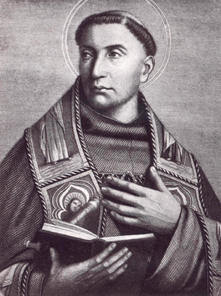
Nothing is known of Bonaventure's parents save their names: Giovanni di Fidanza and Maria Ritella. How his baptismal name of John came to be changed to that of Bonaventure is not clear. An attempt has been made to trace the latter name to the exclamation of St. Francis, O buona ventura, when Bonaventure was brought as an infant to him to be cured of a dangerous illness. This derivation is highly improbable; it seems based on a late fifteenth-century legend.
Bonaventure enjoyed especial veneration even during his lifetime because of his stainless character and of the miracles attributed to him. It was Alexander of Hales who said that Bonaventure seemed to have escaped the curse of Adam's sin. And the story of St. Thomas visiting Bonaventure's cell while the latter was writing the life of St. Francis and finding him in an ecstasy is well known. "Let us leave a saint to work for a saint", said the Angelic Doctor as he withdrew. When, in 1434, Bonaventure's remains were translated to the new church erected at Lyons in honour of St. Francis, his head was found in a perfect state of preservation, the tongue being as red as in life. This miracle not only moved the people of Lyons to choose Bonaventure as their special patron, but also gave a great impetus to the process of his canonization. Dante, writing long before, had given expression to the popular mind by placing Bonaventure among the saints in his "Paradiso", and no canonization was ever more ardently or universally desired than that of Bonaventure. That its inception was so long delayed was mainly due to the deplorable dissensions within the order after Bonaventure's death. Finally on 14 April, 1482, Bonaventure was enrolled in the catalogue of the saints by Sixtus IV. In 1562 Bonaventure's shrine was plundered by the Huguenots and the urn containing his body was burned in the public square. His head was preserved through the heroism of the superior, who hid it at the cost of his life but it disappeared during the French Revolution and every effort to discover it has been in vain. Bonaventure was inscribed among the principal Doctors of the Church by Sixtus V, 14 March, 1557. His feast is celebrated 14 July.




